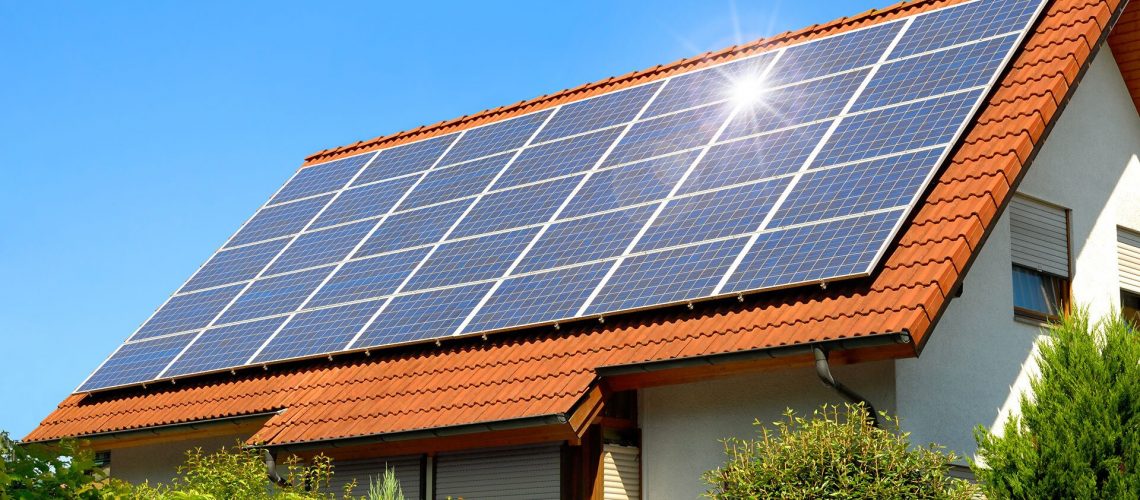It won’t be too long before you see a sparkling ocean of blue as you gaze out of an upstairs window. Unless you live on the coast, it won’t be the English Channel you’re admiring but a sea of solar panel clad roofs.
By the end of 2020, the total number of solar PV installations in the UK was 963,268 systems, – a 99.75% growth compared to 2013 levels. From now until 2026, the distributed solar power generation market is expected to grow at a CAGR of about 1.73%.
So why are so many UK homeowners investing in solar panel installation?
The lower cost of photovoltaic panels has supported adoption, of course, but the surge in growth essentially boils down to the impressive benefits of solar panels.

Solar Panels Reduce Your Carbon Footprint
Harnessing the immense energy source of the sun is one of the most promising strategies in the renewable energy market.
The sun provides Earth with 430 quintillion joules of energy every hour. It’s estimated that we only use 410 quintillion joules globally in a year.
Solar energy, therefore, gives us an endless supply of energy that can be used to generate electricity for your home without having to hook up to the energy grid.
According to Ovo Energy, solar panel systems can potentially eliminate between 1.3 and 1.6 tonnes of carbon dioxide from contaminating the air each year.
Installing solar panels, therefore, enables eco-conscious homeowners with a disliking for fossil fuels (and energy companies) can significantly reduce their lifetime carbon footprint.
Least Impact on the Environment
Of all the renewable energy solutions available in the UK, solar panels have the slightest impact on the environment. You don’t have to destroy forests for your fuel supply and there is no risk of contaminating water supplies.
There is also zero danger to the local community like nuclear power and the infrastructure required to capitalise on energy from the sun is far less than building wind farms.
In addition, solar energy does not require any transportation. It literally falls out of the sky. Harnessing the sun’s natural energy source, therefore, eliminates pollutants associated with generation, transportation and distribution.
Lower Energy Bills
Given most of the power, you use for your home will be generated by the sun, there is less reliance on energy companies.
The Energy Saving Trust estimate homeowners will save between £85 and £220 a year on energy bills depending on where they are located. Homes in the south of England benefit from solar panels more than people in the north because we receive more solar energy.
Cost savings on your energy bill is determined by two factors:
1) How much energy your solar panel produces and
2) How much electricity you use
On average, a 4kW system generates around 3,400kWh of electricity a year. The amounts to around 4, 857 hours of use and will comfortably serve households with four or five inhabitants.
According to UK Power, the average home in the UK uses around 4200kWh. However, the average is hiked up because larger households use more electricity.
To determine what your average use is per year, check your energy bills and calculate how much you use to determine whether you will benefit from solar panels.
Low Maintenance Costs
Solar energy systems don’t have any moving parts so require very little maintenance. Unlike conventional boilers, there is no wear and tear. The only part you need to change is the inverter – and even then, only every 5-10 years.
The only real necessity is to keep them relatively clean. A build-up of debris from dust, exhaust fumes and bird droppings means the photovoltaic panels are less efficient.
Solar panels only need cleaning twice a year. If you don’t have the right equipment, specialist cleaning services are available for around £25-£35.
Increase House Prices
Anybody looking to sell or rent property in the UK is obligated to acquire an Energy Performance Certificate (EPC). An EPC conforms to the energy efficiency of a building, A being the highest and G the lowest.
A report published by Money Super Market shows a significant correlation between house prices and EPC categories. Homes with an EPC rating of A/B sold for 14% more than homes in the area with an EPC rating of G.
EPC ratings are based on how carbon-friendly a property is. It takes in various factors including thermal-efficient material such as loft and wall insulation.
Reports show that properties that have solar panels installed receive a higher EPC rating – and, therefore, increase the value of your home.
Go Off-Grid
Going off-grid is among the key benefits of solar panels that people find most attractive. Whether from necessity or choice, disconnecting from the mains enables you to be energy independent.
Solar power is free and the technology means we don’t have to rely solely on the monopoly of energy suppliers.
However, as mentioned above, you will only generate a limited amount of power from photovoltaic panels so ensure your energy use falls under this limit before you go completely off-grid.
Resell Surplus Energy
In January 2020, the UK government launched a new scheme called the Smart Export Guarantee (SEG).
SEG enables homeowners with solar panels to resell energy they don’t use back to the electric companies. This may be another reason why you don’t want to be too hasty to totally disconnect from the national grid.
Together with lowering your energy bills, you can actually earn money on top if you don’t use all the energy your solar panels generate – which will go some way to paying off the installation costs.
Solar Panel Experts in South-East England
With a growing number of solar energy suppliers popping up all over the UK, our experts can provide homeowners in southeast England with impartial advice.
Our experienced specialists also provide design, installation and maintenance solutions. Get in touch today for more information.

